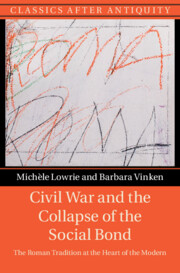17 results
Chapter 1 - Figures of Discord
-
- Book:
- Civil War and the Collapse of the Social Bond
- Published online:
- 06 October 2022
- Print publication:
- 13 October 2022, pp 9-46
-
- Chapter
- Export citation
Introduction
-
- Book:
- Civil War and the Collapse of the Social Bond
- Published online:
- 06 October 2022
- Print publication:
- 13 October 2022, pp 1-8
-
- Chapter
- Export citation
Figures
-
- Book:
- Civil War and the Collapse of the Social Bond
- Published online:
- 06 October 2022
- Print publication:
- 13 October 2022, pp xi-xii
-
- Chapter
- Export citation
Preface
-
- Book:
- Civil War and the Collapse of the Social Bond
- Published online:
- 06 October 2022
- Print publication:
- 13 October 2022, pp xiii-xiv
-
- Chapter
- Export citation
Copyright page
-
- Book:
- Civil War and the Collapse of the Social Bond
- Published online:
- 06 October 2022
- Print publication:
- 13 October 2022, pp vi-vi
-
- Chapter
- Export citation
Dedication
-
- Book:
- Civil War and the Collapse of the Social Bond
- Published online:
- 06 October 2022
- Print publication:
- 13 October 2022, pp vii-vii
-
- Chapter
- Export citation
Chapter 6 - The Empire to Come
-
- Book:
- Civil War and the Collapse of the Social Bond
- Published online:
- 06 October 2022
- Print publication:
- 13 October 2022, pp 256-325
-
- Chapter
- Export citation
Bibliography
-
- Book:
- Civil War and the Collapse of the Social Bond
- Published online:
- 06 October 2022
- Print publication:
- 13 October 2022, pp 326-355
-
- Chapter
- Export citation
Chapter 4 - The Eternal City
-
- Book:
- Civil War and the Collapse of the Social Bond
- Published online:
- 06 October 2022
- Print publication:
- 13 October 2022, pp 144-192
-
- Chapter
- Export citation
Dedication
-
- Book:
- Civil War and the Collapse of the Social Bond
- Published online:
- 06 October 2022
- Print publication:
- 13 October 2022, pp viii-viii
-
- Chapter
- Export citation
Acknowledgments
-
- Book:
- Civil War and the Collapse of the Social Bond
- Published online:
- 06 October 2022
- Print publication:
- 13 October 2022, pp xv-xvi
-
- Chapter
- Export citation
Chapter 5 - The Republic to Come
-
- Book:
- Civil War and the Collapse of the Social Bond
- Published online:
- 06 October 2022
- Print publication:
- 13 October 2022, pp 193-255
-
- Chapter
- Export citation
Chapter 2 - Oriental Empire
-
- Book:
- Civil War and the Collapse of the Social Bond
- Published online:
- 06 October 2022
- Print publication:
- 13 October 2022, pp 47-81
-
- Chapter
- Export citation
Index
-
- Book:
- Civil War and the Collapse of the Social Bond
- Published online:
- 06 October 2022
- Print publication:
- 13 October 2022, pp 356-366
-
- Chapter
- Export citation
Chapter 3 - Empire without End
-
- Book:
- Civil War and the Collapse of the Social Bond
- Published online:
- 06 October 2022
- Print publication:
- 13 October 2022, pp 82-143
-
- Chapter
- Export citation
Contents
-
- Book:
- Civil War and the Collapse of the Social Bond
- Published online:
- 06 October 2022
- Print publication:
- 13 October 2022, pp ix-x
-
- Chapter
- Export citation

Civil War and the Collapse of the Social Bond
- The Roman Tradition at the Heart of the Modern
-
- Published online:
- 06 October 2022
- Print publication:
- 13 October 2022

